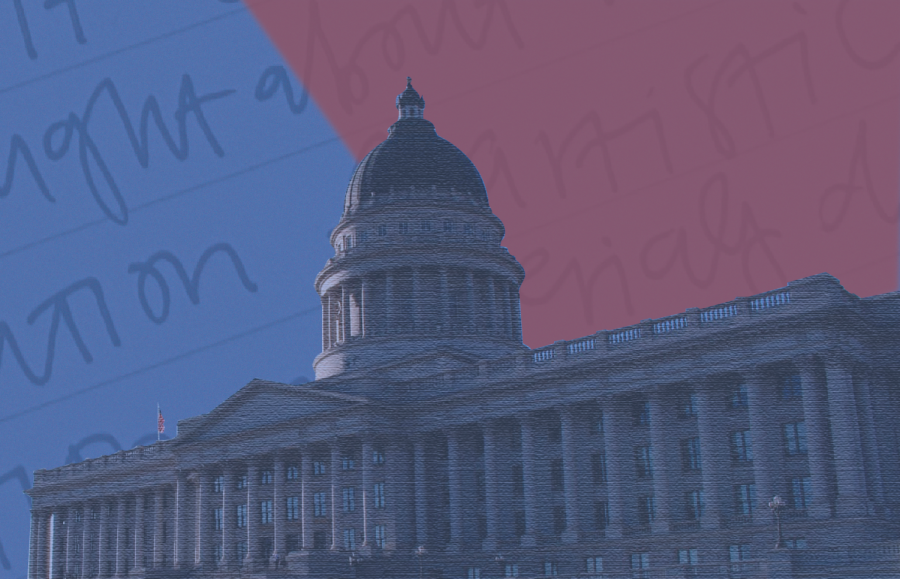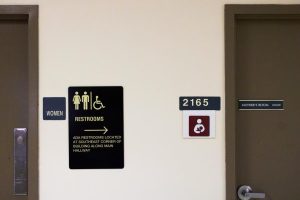Barney: We Need More Pro-Union Laws
(Design by Mary Allen | The Daily Utah Chronicle)
February 11, 2023
Unions are a band-aid on the gunshot wound that is capitalism. Nevertheless, collective bargaining is the working class’s most effective tool. H.B. 241 and H.B. 243 seek to remove loopholes and include specific language that protects the working class. Union participation has been in decline since the ’80s, and Utah specifically has an extremely low union participation rate. Passing H.B. 241 and 243 are just stepping stones towards helping the working class. Fixing our failures regarding the working class should be our top priority.
H.B. 241 amends some language in the pre-existing Utah labor laws — namely, it redefines how funds can be used with unions that are in the public sector by specifically not allowing employers to treat unions unequally from other organizations. According to the bill’s sponsor, Rep. Teuscher, “The bill is trying to say you can’t treat a labor union any differently than you would treat any other organization.” It allows equity between public employers and unions — such that they are unable to involve themselves with union funds.
“It’s making sure that it’s a level playing field and that they’re not treated differently because it’s a labor union,” Teuscher said.
H.B. 243 redefines who can unionize in the Utah public transit. It stops those with a conflicting interest from unionizing. What H.B. 243 fails to do is allow transit employees to strike, essentially declawing transit unions. This isn’t new, since we’ve had laws in place to stop rail workers from striking for years, because if a strike were to happen it would impair the economy.
Recall in 2022 how the bourgeois Biden administration, with the bipartisan support of Congress, trampled over rail workers who wanted to strike. The expressed purpose of their strike was to get more paid sick days. Both Democrats and Republicans have failed to acknowledge the underlying issue. Rather than supporting those who prop us up, our government opts to side against workers. They had the opportunity to put significant pressure on rail companies to help fight for the rights of workers, but decided against it.
The system we live in depends on consumption and the flow of money. Without that flow, business stops, jobs are lost. Unions are effective because of collective bargaining. Workers generate the flow of money that we all depend on. Strikes are effective because they stop this flow. It’s better for everyone if governments and companies incentivize workers to continue working, which is why the Biden administration’s decision is such a kick in the teeth.
Unionizing is one of the best ways to allow the working class to have agency over their workplaces. Membership in a union typically offers higher salaries and is correlated to higher wages even for non-union members. Unionizing is just beneficial for everyone.
As a country, we accept democracy as a political system. This makes sense — we want a say in what our government does. It would also logically follow that we would want some sort of democracy in the workplace. We spend significant amounts of our lives at work — to not want control over such an important aspect of life is asinine.
Unionization can reduce income inequality, meaning more people with more than the bare minimum to survive. Unions offer a choice for the working class, which is essentially everyone. More than anything, they offer security. In the past 20 years we have had multiple recessions and are due for a housing crisis. Let’s be realistic, these circumstances aren’t the fault of workers — even if they were, everyone needs to eat.
Faculty at universities are great examples of an important sector to unionize. A large percentage of national research is done by higher education institutions like the University of Utah. It’s conducted by graduate students, undergraduate students and faculty, all of whom are underpaid for the work that they do. Nevertheless, they play a critical role in our education system.
As university students, we typically hope our degrees will land us jobs, but the end goal isn’t a job. We want good jobs, ones we can enjoy and ones where we can influence the direction of said job. Even this isn’t the end goal — our jobs aren’t the only thing we live for. Work-life balance is extremely important. Unions are a tool that will help achieve reasonable working conditions for workers.
Closing loopholes, such as the need for a second vote, to union laws could potentially influence union participation. Many people opt out of voting for unions because of coercive tactics used by employers. Our executives need to pursue real, effective action against employers who break labor laws and discriminate against unions. Mega-Corporations like Amazon have had disgusting labor practices and have repeatedly employed union busting tactics, with slap-on-the-wrist punishments for bad business practices.
These tactics are extremely effective at discouraging unionization, because of course they are. When faced with the prospect of losing your livelihood, you typically bend. When you aren’t alone, you mitigate that risk. This is why collective bargaining is necessary.
Companies are able to get away with this behavior because there isn’t significant pushback to their actions. Bureaucratic organizations like the Federal Trade Commission and the National Labor Relations Board struggle to help workers in the face of overwhelming capital. Even when they do help, they regularly fail to make significant changes. We don’t just need comprehensive legislation, we need enforcement. We can’t be weak on our pushback, we have to respond with complete solidarity.
As workers, as a society and as an economy, we have every reason to unionize. It’s the best option for everyone. Closing loopholes and enforcing labor laws will encourage democratic workplaces. Incentivizing unionization through our politics is necessary and the first step to having real agency over our lives.













